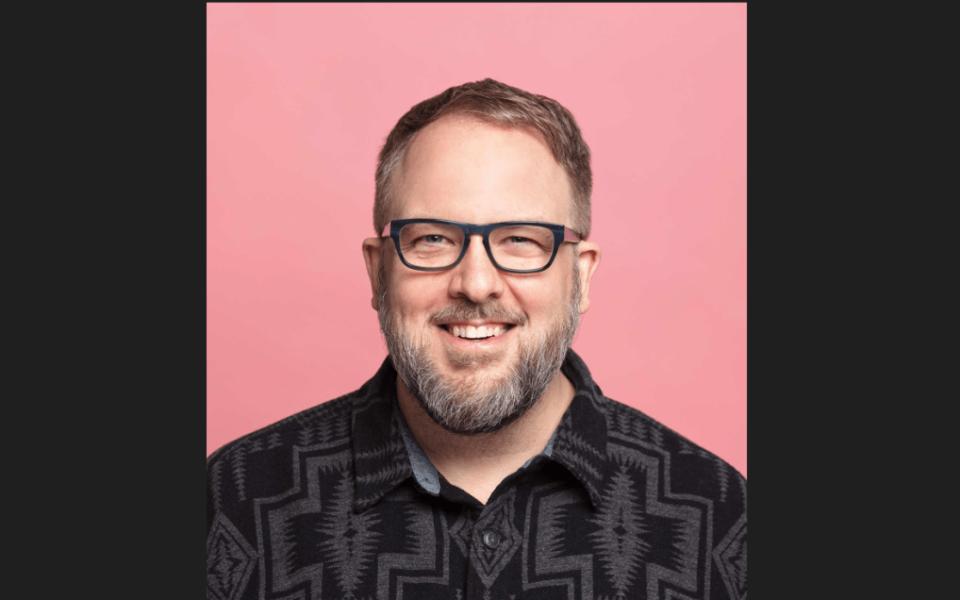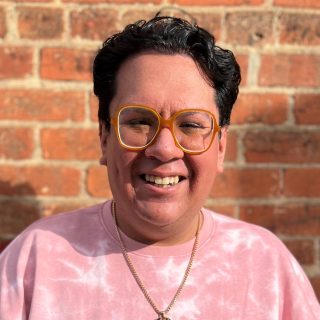Featured photo: Author Greggor Mattson (photo by Tanya Rosen-Jones)
Greggor Mattson has traveled 10,000 miles to visit gay bars across the United States for his newest book, Who Needs Gay Bars? Bar Hopping through America’s Endangered LGBTQ+ Places. Mattson, the chair and professor of sociology at Oberlin College and Conservatory, will be discussing the cultural significance of gay bars at Scuppernong Books in downtown Greensboro on Thursday at 6 p.m. Learn more about Mattson at greggormattson.com.
This interview has been edited for length and clarity.
Can you take us through the journey or moment that inspired Who Needs Gay Bars?
My favorite gay bar A Man’s World in Cleveland closed, and there wasn’t really information about gay bar closure. We were getting newspaper reports out of big coastal cities, but they have a gay press to advertise goings on. At the time, we didn’t have one in Cleveland. So I was sad that the gay bar closed.
I was also furious because of the way that journalists and real estate developers wrote about that corner. They kept saying, it was an ‘empty, vacant, and toxic nowhere” but it was full of drug dealers and prostitutes. I’m like, it can’t be both, and those weren’t drug dealers and prostitutes. Those were queer people of color.
One of the things I liked about this bar was that in a Black-majority city like Cleveland, many of the other bars were quite white, and I appreciated that this was a bar that looked like the city. When I had some time, I started researching rates of closure in gay bars and I had to build a data set. It took two-and-a-half years. What I found is that 45 percent of gay bars closed between 2002 and 2023.

What was your first experience a gay bar and how did you find it?
Going to a gay bar is a rite of passage for LGBTQ+ people, even for people who don’t live near one. My first time was a gay bar in Portland, Ore. It’s weird to call it a gay bar because it didn’t serve alcohol. It was an all-ages gay nightclub for teenagers.
How would you define a gay bar? Who is it for and who is invited?
One of the things that’s interesting about what counts as a gay bar is it varies across the country. In some parts of the country, a bar will be described as an alternative lifestyle bar, or some of the owners describe it as an everybody bar.
For me, a gay bar reproduces queer culture.
Another thing I found was that in small cities and rural areas, straight people have always been part of gay bars. What I was surprised by was what many of these owners said. I had expected them to say, ‘We can’t afford to function without straight people.’ I thought it was going to be an economic necessity. But instead, what they said was, ‘I chose to live in a small city to be near my sister and her kids and my friends from high school, and I was never going to open a bar that they felt uncomfortable in.’ It really was about friends and family more than allies.
How does the current political landscape impact gay bars?
It’s interesting because I was doing these interviews in the wake of the 2016 election of Donald Trump and his anti-trans policies. Many of the owners said, ‘People said we didn’t need a safe space because of eight years of Obama.’ Now suddenly, they’ve rediscovered that need for safety. The current landscape of anti-trans and anti-drag bills is a reminder that many parts of the community still need places to feel safe and that gay bars have not always been safe places for trans and gender non-binary people.
Do you have a favorite or memorable moment from a gay bar that you visited?
I never pick favorites for gay bars because it’s like asking who’s your favorite child. I would say I have hundreds of favorites. If I want a happy hour with queer elders, I’ll pick one bar. If I want to dance the night away, I’ll pick a different bar. If I want to hang out with friends, I might pick a third bar. My favorite thing is always the conversations.
You’ve talked before that gay bars are not dying, they are evolving. Can you say more about that?
The fastest closing type of gay bar is a bar that serves only cisgender men. I acknowledge that for some of our elders those places were their sanctuaries. However, we have been organizing as an LGBTQ+ community for the last 40 years. I think it’s quite natural that young queer people want to hang out with all genders, and it’s quite natural that our places reflect that.
Anything else you want to share?
One of the constant questions I get is, ’Why didn’t you write about this bar that was where I came out 30 years ago and it doesn’t exist anymore?’ I’m like, ‘Well, I think you answered your own question.’
The last thing in that book that I call on readers is to tell their own stories. I’m only one person and I come from a certain background. I tried to embrace our whole community, but we can tell our own stories best. So when people at these talks say, ’Why didn’t you write about my bar?’ I’m like, ‘Why don’t you write about your bar?’ Write about it for your local journalists, write about it for your reading group, write about it for your religious community.
Tell our stories because they haven’t always gotten a hearing and they deserve to be told.
Join the First Amendment Society, a membership that goes directly to funding TCB‘s newsroom.
We believe that reporting can save the world.
The TCB First Amendment Society recognizes the vital role of a free, unfettered press with a bundling of local experiences designed to build community, and unique engagements with our newsroom that will help you understand, and shape, local journalism’s critical role in uplifting the people in our cities.
All revenue goes directly into the newsroom as reporters’ salaries and freelance commissions.


Leave a Reply